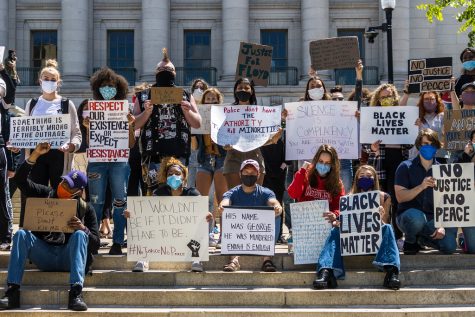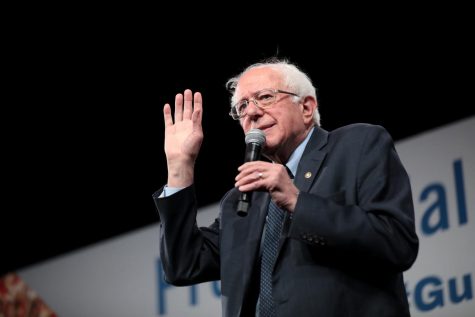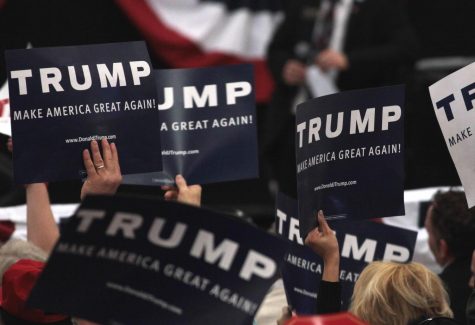When Iran Attacks Saudis, U.S. Must Strike Back

The United States needs to respond to the recent attack on Saudi Arabia to convey strength on the world stage. (Courtesy of Twitter)
October 1, 2019
On Saturday, Sept. 14, the most intense escalation yet of the growing proxy conflict in the Middle East dramatically showcased the new boldness of Iran and cast scrutiny on America’s role as a leader in the region.
At least 20 cruise missiles and drones launched from somewhere northwest of Saudi Arabia slammed into the Kingdom’s Aramco oil refinery at Abqaiq, instantly halving the production capability of Saudi oil fields and cutting total world output by 5%. In the immediate aftermath, crude prices skyrocketed in their most significant jump in history, and President Trump authorized access to America’s strategic reserves of oil to stabilize U.S. markets.
As the dust settles and fingers are pointed, the question of retaliation remains. The answer that President Trump settles on could redefine the U.S.’s role in the Middle East for decades to come. It is imperative we walk a fine line between aggression and obeisance, both securing the U.S.’s continuing interests and avoiding a region-wide conflict.
Iran and Saudi Arabia share a long history of adversity and have long engaged in proxy conflicts through the myriad bush wars and regional uprisings throughout the Middle East. Divided not only by geopolitics but also by religion, these two enemies are the greatest regional powers in the region and fundamentally opposed on every level — a dangerous combination.
Iran openly supports the rebel Houthis in Yemen, a country where the established government is an ally of Saudi Arabia, arming and training them, most notably with drones and missiles that allow the Houthi mountain tribesmen to launch remarkably advanced attacks on Saudi cities and infrastructure. Though American-built Saudi missile defense systems have proved successful in preventing any major damage from these short-range Houthi rockets in the past, the attacks of Sept. 14 were carried out using much more modern and long-range weaponry, pointing to a culprit with capabilities far more advanced than those of rural shepherds — either the Iranian military or any of the Iranian-backed militias operating in Iraq and Kurdistan.
The attack and its immediate aftermath revealed the shocking vulnerability of the Middle Eastern oil industry to a bad actor, whether that actor is Iran, Al-Qaeda or another extremist group. The Abqaiq production facility, although vital to Saudi Arabia’s economy, was undefended against attack, despite the Saudis’ having access to the most advanced missile defense systems in the world.
The immediate economic aftermath, while not catastrophic, was still historical in its scope. And while the U.S. is largely independent of Middle Eastern oil thanks to the recent shale drilling boom, many other countries are not so fortunate. In this strike, Iran has revealed a new dimension of warfare, a nightmarish marriage of the modern global economy and the modern high-tech missile, where a single, undetectable and easily-obscured attack can cause massive damage to a country’s vital economic and industrial areas.
The looming question, then, is what the U.S. response should be. In the immediate aftermath, the U.S. should closely study the nature of the attack — where it came from, how it was carried out and how best to defend against similar strikes. Not only will this provide more certain answers as to the culprit, but it could also reveal extremely useful information on how these attacks can be prevented, in case we should, God forbid, find the United States facing a similar predicament.
More pressingly, a decision must be made about consequences for the perpetrator. If the aggressor is Iran — as it most assuredly is — then action must be taken not only by the United States and Saudi Arabia but our European and Asian partners as well. Those with interests in the region must be unified in their unequivocal denunciation of such unwarranted aggression and, accordingly, plan a united response.
The response doesn’t necessarily have to be retaliatory strikes, which may be an unwise escalation. More prudent might be further economic sanctions or diplomatic penalties on Iran, especially Iranian figures suspected to be directly or indirectly involved in the attack, such as generals in the Revolutionary Guard who arm and train rebel groups.
Regardless of the exact action taken, a definitive response must be made soon, with the full force of both the United States and our allies behind it — else President Trump appear weak in the eyes of not only Iran but the world. Both he and his administration have been unclear about what retaliation, if any, will be carried out, and Trump and Secretary of State Mike Pompeo have publicly oscillated between claiming they don’t want war and denouncing the attack as “an act of war.”
Inconsistency this long after the attack serves only to weaken our position as a leader in the Middle East. The President must work quickly with our allies abroad and send a stern message to Iran and anyone else who thinks attacks like those at Abqaiq are appropriate or useful geopolitical activities — or risk abdicating the United States’ role in guaranteeing the stability of not only the Middle East but the global economy.
Timothy Kyle, FCRH ’21, is a political science major from West Hartford, Connecticut.









If you want a picture to show with your comment, go get a gravatar.